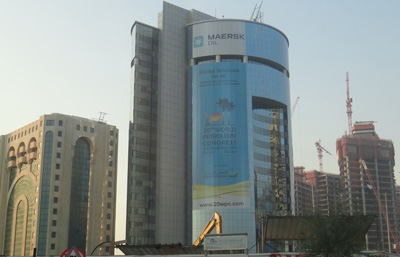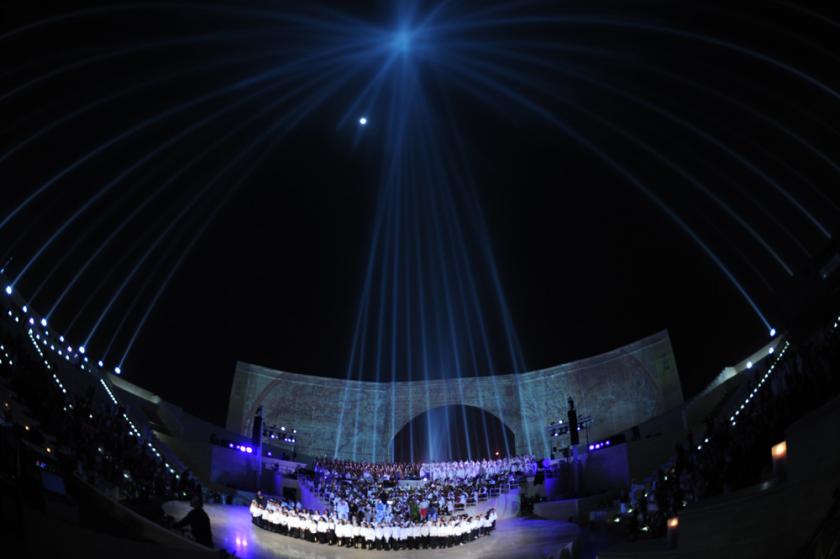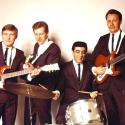If you need music for a ceremonial occasion, Greek composer Vangelis is your man. He has, after all, even had a small planet named after him, and in 2001, NASA used his piece Mythodea as the theme for its Mars Odyssey mission. The following year, FIFA hired Vangelis to concoct the official anthem for the 2002 World Cup. In 2004, he draped aural grandiosity across Oliver Stone's implausible Alexander.
Who better, then, to write a celebratory opus for the grand opening of the open-air Katara Amphitheatre in Doha, in the unfeasibly wealthy Gulf state of Qatar. "Vangelis to open Katara's Village Gem with exquisite symphonies," said the promotional bumph helpfully. Money being no object, the concert would bring together the Qatar Philharmonic Orchestra (a multinational ensemble with a preponderance of German musicians) and Moscow's Yurlov State Academic Choir, boosted by a blast of superstar glitter from soprano Angela Gheorghiu and her husband, "tenorissimo" Roberto Alagna. The operatic pair have been suffering much-publicised "difficulties" in their marriage, now apparently resolved, but the last thing we heard, opera's erstwhile Most Romantic Couple wouldn't be singing together again until their appearance in La bohème at Covent Garden next year. Yet sure enough, here they were, and looking remarkably happy together (Doha amphitheatre by day, pictured below).
 Whether Vangelis's newly composed works - which will appear on an album on Universal next year, while the concert was filmed for DVD by Chariots of Fire director Hugh Hudson - were the showcase they would have desired remains moot. Gheorghiu was first out of the starting gate with lengthy contributions to Vangelis's Choral Symphony, said to be inspired by the Orpheus myth and split into five movements with titles like The Stars, The Suns and Night. On first hearing, a lot of it sounded like generic aural wallpaper of the kind that denotes oceans or deserts in those Mummy movies. Gheorghiu, shrouded in a flowing crimson garment and bracing herself against a stiff breeze from the nearby Arabian Gulf, lent it a burnished aura it probably didn't deserve. The Gheorghiu-Alagna duet which followed fared better, largely because Vangelis (a grey-haired, wizened figure who could be glimpsed occasionally amid a cluster of gadgetry in the midst of the orchestra) had composed it as a pastiche of a 19th-century Italian operatic aria. (Dhows at anchor, pictured below.)
Whether Vangelis's newly composed works - which will appear on an album on Universal next year, while the concert was filmed for DVD by Chariots of Fire director Hugh Hudson - were the showcase they would have desired remains moot. Gheorghiu was first out of the starting gate with lengthy contributions to Vangelis's Choral Symphony, said to be inspired by the Orpheus myth and split into five movements with titles like The Stars, The Suns and Night. On first hearing, a lot of it sounded like generic aural wallpaper of the kind that denotes oceans or deserts in those Mummy movies. Gheorghiu, shrouded in a flowing crimson garment and bracing herself against a stiff breeze from the nearby Arabian Gulf, lent it a burnished aura it probably didn't deserve. The Gheorghiu-Alagna duet which followed fared better, largely because Vangelis (a grey-haired, wizened figure who could be glimpsed occasionally amid a cluster of gadgetry in the midst of the orchestra) had composed it as a pastiche of a 19th-century Italian operatic aria. (Dhows at anchor, pictured below.)
 Proceedings had commenced with another new piece, some sort of plea for global tolerance and understanding with contributions from an American Indian in full-scale feathered costume, a digeridoo player, a sitarist, a chap playing a kind of lute/zither hybrid, and an African drummer who'd been flown in from Leeds. Some of it sounded like Carmina Burana, and other bits were like Led Zeppelin's "Kashmir" shorn of the hirsute caterwaulings of Percy Plant.
Proceedings had commenced with another new piece, some sort of plea for global tolerance and understanding with contributions from an American Indian in full-scale feathered costume, a digeridoo player, a sitarist, a chap playing a kind of lute/zither hybrid, and an African drummer who'd been flown in from Leeds. Some of it sounded like Carmina Burana, and other bits were like Led Zeppelin's "Kashmir" shorn of the hirsute caterwaulings of Percy Plant.
Far more amusing were the frequent interpolations by the evening's master of ceremonies, Jeremy Irons, who swept out onto the apron stage wearing the kind of floor-length monkish habit he'd once modelled in The Mission. Beaming cheerfully and semaphoring his arms about as if herding camels, he unleashed gales of preposterous thespian waffle about harmony, respect, togetherness and "universal understanding". The audience, comprising numerous members of the Qatari royal family among assorted European and American guests who are presumably getting filthy rich trading the local oil and natural gas, applauded politely. But not even Jeremy's delightful performance could dissuade a huge number of the specially invited guests from leaving halfway through the show, marching down the aisles towards the exits even while orchestra and Ms Gheorghiu were churning it out at full tilt. Seemed rather rude, frankly.
 But no doubt it was illustrative of the hurdles Qatar faces in trying to turn itself into an oasis of international culture. All the money in the world isn't going to let you create instant implants of traditions of music, opera, theatre or dance which have grown up in other parts of the globe, though they plan to give it a try. Earlier, we'd been shown around the new Katara Cultural Village (pictured above), of which the amphitheatre forms a part, by the persuasive and charming Dr Emad Amralla Sultan (director of cultural affairs). He showed us the new theatre and opera house, and the array of galleries and workshops which, he intends, will become a hub for work by local and regional artists. Designed in emulation of a traditional Arab village, the cool, low-rise buildings are in deliberate contrast to the thickets of glittering skyscrapers shooting up out of the ground in downtown Doha (pictured below).
But no doubt it was illustrative of the hurdles Qatar faces in trying to turn itself into an oasis of international culture. All the money in the world isn't going to let you create instant implants of traditions of music, opera, theatre or dance which have grown up in other parts of the globe, though they plan to give it a try. Earlier, we'd been shown around the new Katara Cultural Village (pictured above), of which the amphitheatre forms a part, by the persuasive and charming Dr Emad Amralla Sultan (director of cultural affairs). He showed us the new theatre and opera house, and the array of galleries and workshops which, he intends, will become a hub for work by local and regional artists. Designed in emulation of a traditional Arab village, the cool, low-rise buildings are in deliberate contrast to the thickets of glittering skyscrapers shooting up out of the ground in downtown Doha (pictured below).
 Qatar is aiming to plug into international film and theatrical markets, too. This weekend, Kevin Spacey has been appearing there in Richard III with the travelling Bridge Project production directed by Sam Mendes and sponsored by the Doha Film Institute. In October, the city hosted the Doha Tribeca Film Festival, which presented, among other things, the new historical epic Black Gold, a saga of warring desert tribes and oil exploration in the Arabian peninsula in the 1930s. Starring Antonio Banderas, Mark Strong and Freida Pinto and shot in Tunisia and Qatar, the movie has been funded by the Doha Film Institute and Tunisian producer Tarak Ben Ammar's Quinta Communications. With Western economies suspended over vast black holes of debt, who knows where tomorrow's multiplex-fillers might come from?
Qatar is aiming to plug into international film and theatrical markets, too. This weekend, Kevin Spacey has been appearing there in Richard III with the travelling Bridge Project production directed by Sam Mendes and sponsored by the Doha Film Institute. In October, the city hosted the Doha Tribeca Film Festival, which presented, among other things, the new historical epic Black Gold, a saga of warring desert tribes and oil exploration in the Arabian peninsula in the 1930s. Starring Antonio Banderas, Mark Strong and Freida Pinto and shot in Tunisia and Qatar, the movie has been funded by the Doha Film Institute and Tunisian producer Tarak Ben Ammar's Quinta Communications. With Western economies suspended over vast black holes of debt, who knows where tomorrow's multiplex-fillers might come from?















Add comment